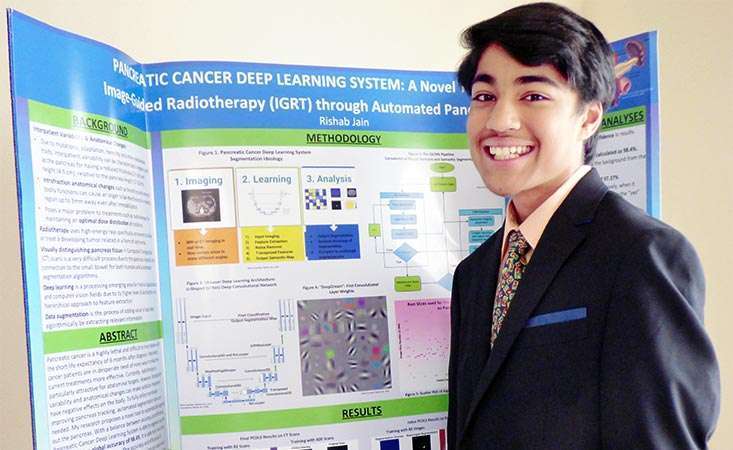
Rishab Jain, 13, is interested in using artificial intelligence to improve pancreatic cancer treatment.
Editor’s note, Oct. 17, 2018: We are delighted to report that Rishab Jain won the Discovery Education 3M Young Scientist Challenge. Congratulations to Rishab and please keep up the terrific work!
“I always have a lot of fun learning about artificial intelligence (AI) when I work on programming and computer science projects with my father, who is an engineer. With my curiosity about AI technology, I researched machine learning and posed a question for myself to see if I could use that knowledge to solve a real-world challenge.”
These are the musings of Rishab Jain of Portland, Ore.
Congratulations to Rishab Jain for winning @DiscoveryEd @3M’s #YoungScientist Challenge for his work, which applies #machinelearning & #AI to improving treatment of #pancreaticcancer! https://t.co/mFXkxdJV3W @sandeep_OR #PANCaware https://t.co/kgHB5RSrAx
— PanCAN (@PanCAN) October 17, 2018
At 13 years old, he’s interested in applying AI and machine learning to improve the treatment of pancreatic cancer.
(Yes, you read that correctly. He’s barely a teenager.)
Jain is a finalist for the Discovery Education 3M Young Scientist Challenge for his project entitled, “Pancreatic Cancer Deep Learning System: A Novel Tool for Improved Image-Guided Radiotherapy (IGRT) through Automated Pancreas Segmentation.”
“I have always been inspired by my brother and family members who work and research in the medical field,” Jain said. “I’ve seen how much fun they had with STEM [science, technology, engineering and math] careers and how it gave them the opportunity to make immediate differences in people’s lives.”
He continued, “In past years, I was deeply moved by family friends passing away from cancer. Last summer, when I visited my brother in Boston, I learned about a local laboratory that focuses on pancreatic cancer research. I discovered how deadly of a disease it is, and that it has a surprisingly low survival rate.”
This prompted Jain to consider how AI and machine learning may benefit pancreatic cancer patients and improve their outcomes. The aim of his project is to investigate how to utilize these innovative technologies to help accurately locate the pancreas via magnetic resonance imaging (MRI) – and then apply this technique to MRI-guided radiation therapy of the disease.
The long-term goal is to minimize radiation exposure to healthy tissue and maximize the treatment’s ability to kill cancer cells.
As for goals for himself, Jain said, “I want to study medicine and begin my career as a biomedical engineer. This career combines the parts of technology, engineering and medicine that excite me most.”
He added, “I believe that AI will revolutionize the prevention and treatment of pancreatic cancer.”
The grand prize winner and runners-up for the Young Scientist Challenge will be announced on Oct. 16. The Pancreatic Cancer Action Network will be rooting for you, Rishab!
Hear more from Rishab Jain about his research project:
Our @3M #YoungScientist finalist Rishab is aiming to rid the world of pancreatic cancer by using artificial intelligence to improve MRI readings. See how he was able to achieve an accuracy of 98.4%: https://t.co/v1sWLkKWU6 pic.twitter.com/9VVaLnGHAn
— Discovery Education (@DiscoveryEd) September 18, 2018





